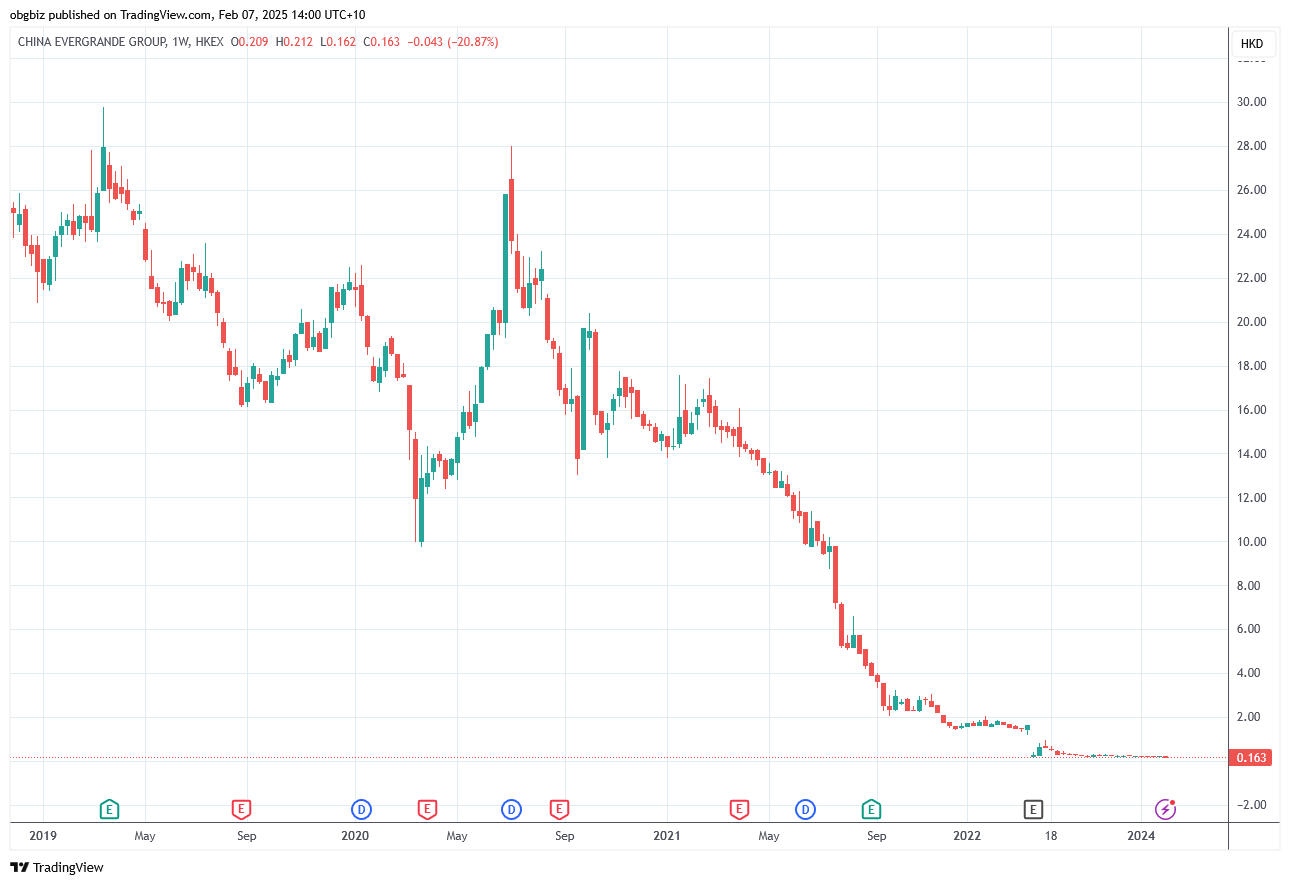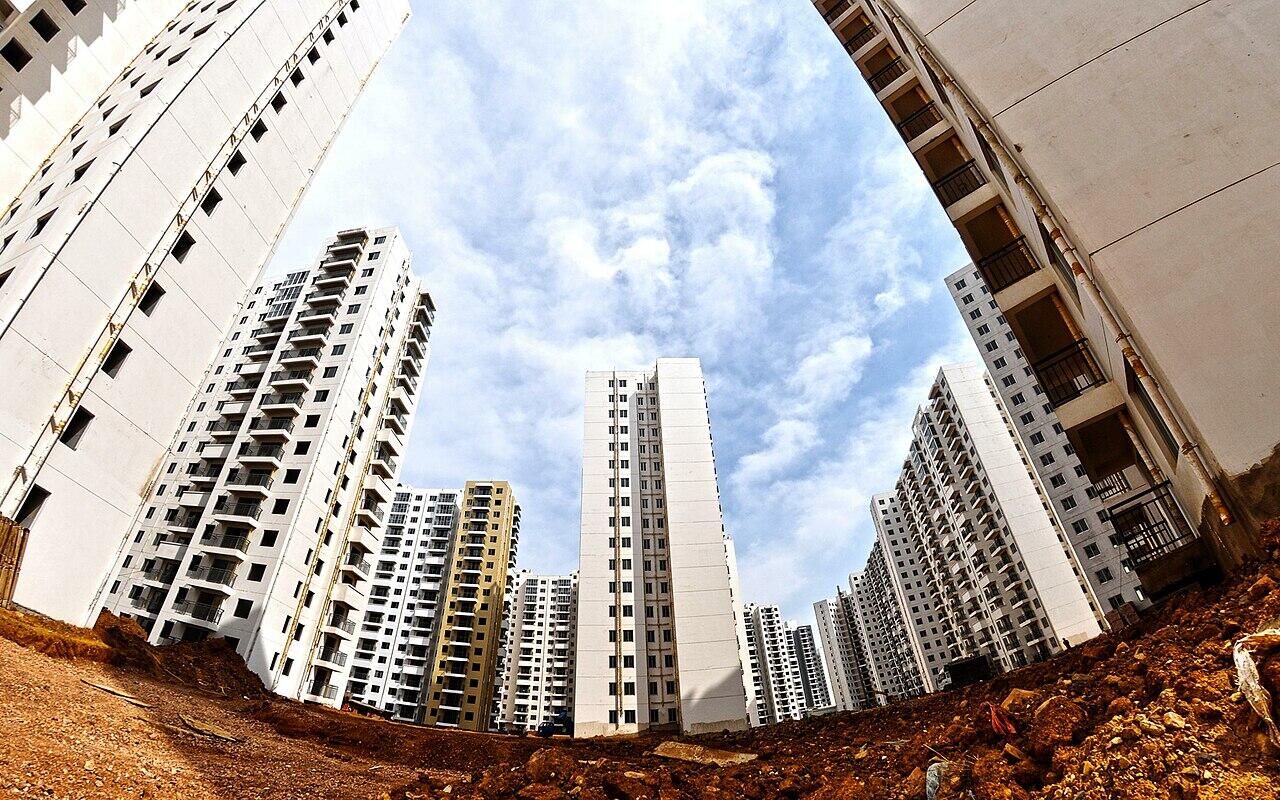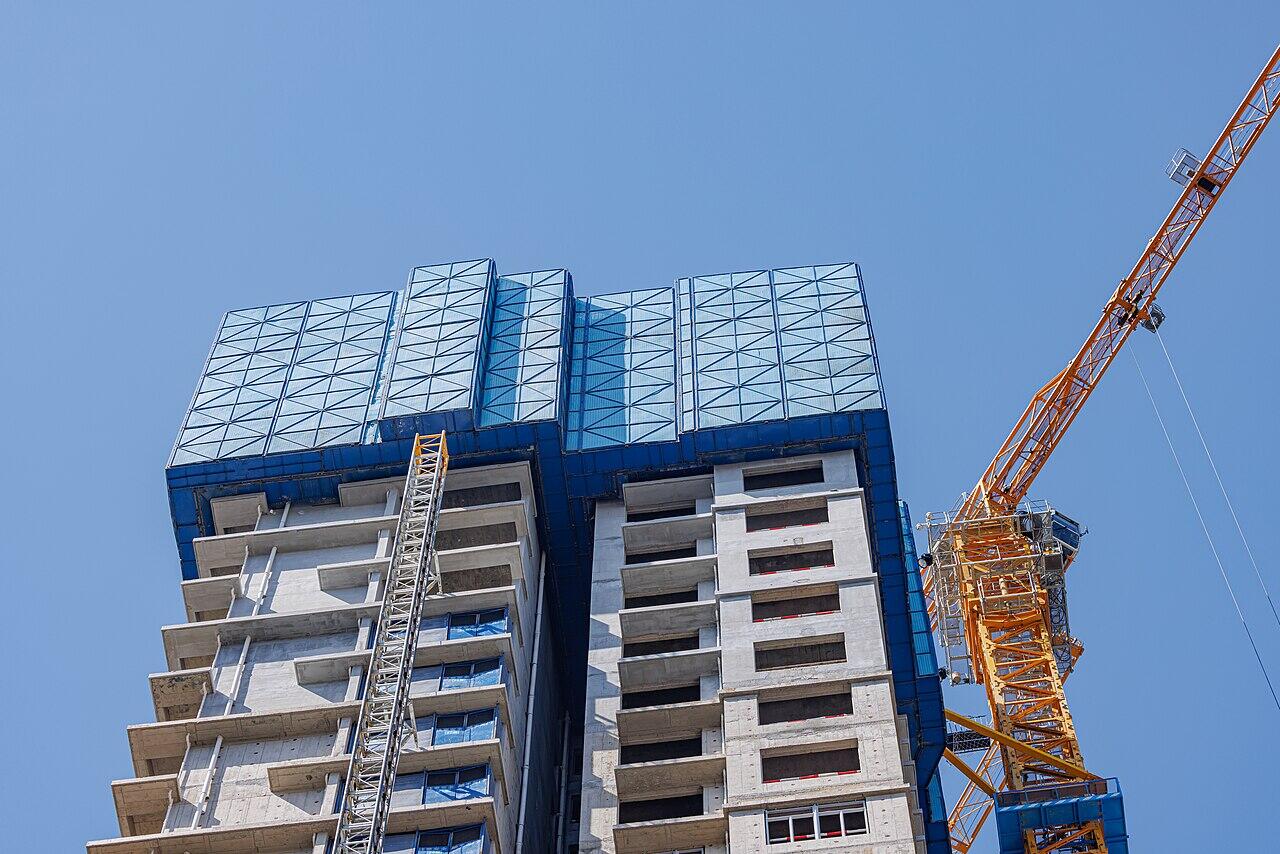China’s real estate sector, a vital pillar of the economy, continues to face mounting challenges as it enters its fifth year of crisis in 2025. Major developers are struggling with rising debt, liquidation petitions, and plunging stock prices, despite ongoing government efforts to stabilise the market.
A Brief History
The Chinese property sector crisis began in 2021 with Evergrande Group's default, following years of overbuilding and tight government corporate debt regulations. The crisis quickly spread to major developers, including Country Garden, Kaisa Group, and Sunac, as a deepening contagion of financial instability spread throughout the sector.
Evergrande’s troubles escalated after a leaked letter in August 2021 revealed its liquidity concerns. As investor confidence collapsed, its stock price plunged, affecting global markets and reducing foreign investment in China.
Attempts to sell assets failed, and the company missed multiple debt payments before defaulting on an offshore bond in December 2021. International ratings agencies, including Fitch, subsequently classified Evergrande as in "restricted default," marking a turning point in China's property downturn.

China’s Real Estate Crisis Deepens as Developer Defaults Mount
Sunac China Holdings Ltd., a defaulted Chinese developer, recently received another liquidation petition, while several other major builders are set to defend against similar petitions in the first half of 2025.
Country Garden aims to finalise a debt restructuring deal in February as China’s property sector struggles. The developer defaulted on US$11 billion in offshore bonds, with plans to cut its $16.4 billion offshore debt by 70%.
Tianji Holding, a Hong Kong unit of China Evergrande Group, secured an eight-week extension after a judge postponed its winding-up hearing to March 12. The petition against Tianji was filed in November by Evergrande's liquidators, Edward Middleton and Tiffany Wong of Alvarez & Marsal Asia.
In addition, China Vanke Co., one of the country’s largest property firms, faces $4.9 billion in yuan- and dollar-denominated bonds maturing or facing redemption options in 2025, its highest annual amount ever, according to Bloomberg data.
The distressed developer also forecast a record loss in 2024, announcing in January that Chairman Yu Liang and CEO Zhu Jiusheng resigned as the company braces for a record $6.2 billion net loss in 2024. The departure comes amid growing concerns about developer liquidity and debt repayment risks.
Xin Jie, chairman of Vanke’s state-owned shareholder Shenzhen Metro, will take over as chairman, signalling tighter state oversight.
The move raises expectations that the government may step in to stabilise the company as it faces key debt maturities this year.

Government Interventions and Market Impact
In response to the crisis, the Chinese government has introduced multiple measures to support the housing market. These include reducing borrowing costs on existing mortgages, easing purchase restrictions in major cities, and lowering property transaction taxes.
However, these interventions have had limited impact, with sales from the country’s top 100 developers falling by 28.1% in 2024, a sharp decline than the 16.5% drop recorded in 2023.
The crisis has left a visible mark on the landscape, with abandoned construction sites and half-finished high-rises reflecting the sector’s struggles. As major developers face liquidation and local governments grapple with mounting debt and unfinished projects, home purchases have fallen to record lows.
Despite ongoing government interventions, the market remains volatile. Analysts at JPMorgan Chase warn that struggling Chinese developers will likely be the largest source of defaults in Asia by 2025, underscoring the broader economic risks posed by the real estate sector’s prolonged downturn.
However, S&P Global posits that China’s troubled property sector may be nearing a turning point amid strong secondary home sales, which have outperformed the primary market since 2022.
S&P Global Ratings says the government's September 2023 policy measures have boosted this segment, particularly in higher-tier cities. The uptick in secondary home transactions suggests that underlying demand for housing remains strong, despite years of turbulence in the sector.
Analysts believe this trend signals that government interventions are gradually fostering a structured recovery.
"We believe that this shows real appetite for homes remains sound in China," S&P Global Ratings noted in its report. "It also indicates to us that government policies are resulting in a sequenced recovery."
S&P analysts noted an important caveat: "A sudden default by a surviving Chinese developer this year may hit sentiment before any rebound truly takes hold.”
As The Diplomat’s Yuan Shi notes, “China’s housing market faces a pivotal moment. If prices continue to rise unchecked while economic growth slows, the disconnect between wages and housing costs will widen further, threatening both social stability and consumer confidence.”

China Targets Real Estate Stabilisation in 2025
Reuters reported in December that China would continue efforts in 2025 to stabilise its real estate market, following a work conference held by the housing regulator. The government plans to reform the commercial housing sales system and extend urban village renovation efforts, adding beyond 1 million units.
Measures will focus on controlling commercial housing supply while increasing affordable housing to address the needs of new citizens, young people, and migrant workers.
Policymakers have introduced measures to revive the market after a government-led campaign in 2021 to curb highly leveraged developers. Since September, these have included mortgage rate cuts, reduced down-payments, and tax incentives. Home transactions saw growth in October and November, indicating some stabilisation, while home prices declined at the slowest rate in 17 months in November.
Officials have called for quicker policy measures to stabilise the market and for local governments to have more control over housing stock.
Hong Kong Tycoons Lose Billions in Property Slump
Hong Kong’s wealthy elite have also suffered massive property losses in 2024, offloading assets at deep discounts due to a weak economy and high interest rates. Agile Group chairman Chen Zhuolin lost US$16 million in November after selling nine Kowloon Tong flats at discounts of up to 63%.
The ongoing real estate slump has also hit tycoons like Hui Ka-yan of Evergrande and the Ho Shung-pun family. Forced sales reflect the broader four-year decline in China’s property market, which continues to erode major real estate investors' fortunes.
More tweaks ahead for real estate policies
According to Chinadaily.cn, economists and analysts said China may need to fine-tune its real estate policies in 2025 to better manage developer debt risks, with the Central Economic Work Conference in December calling for reversing the downturn and stabilising the property market.
China Real Estate Information Corp (CRIC) said capital market debt maturities of Chinese property developers are projected to reach 525.7 billion yuan ($72.5 billion) in 2025, 8.9% up from 2024. CRIC predicts that the third quarter will be a peak for debt repayments with maturities worth about 157.4 billion yuan.
Zhang Ming, deputy director of the Institute of Finance and Banking at the Chinese Academy of Social Sciences said, “To resolve real estate market risks, it is necessary to gradually shift from simply safeguarding housing project deliveries to fully supporting qualified enterprises.”
Zhang suggested implementing a combination of measures for developers to extend debt maturities, reduce repayment obligations, and strengthen capital through debt-to-equity swaps or new investments.
To ensure that pre-sold real estate projects have access to the necessary funding, China introduced a real estate financing coordination mechanism last year.
Via the mechanism, Chinese banks had approved 5.6 trillion yuan worth of loans to property projects as of Jan 22, financing the delivery of 14 million homes, the National Financial Regulatory Administration said.
However, the total financing of 65 typical Chinese real estate enterprises in 2024 was 462.9 billion yuan, down 31 percent from 2023, according to CRIC.
Shi Lulu, director of Asia-Pacific corporate ratings at Fitch Ratings, said higher debt maturities, weakening sales, declining margins and reduced cash generation may continue in 2025 for many Chinese homebuilders.
Conclusion
As China’s property sector navigates its fifth year of turmoil, the government's attempts to stabilise the market have seen limited success. With mounting debts, declining sales, and legal pressures, the sector’s recovery remains uncertain.
As the real estate market continues to struggle, the broader economic implications for China and beyond remain a significant concern.
